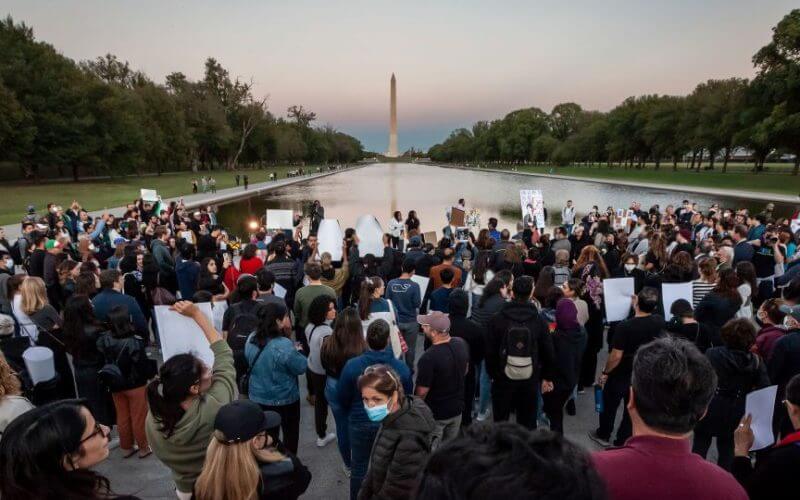Summary
Amidst ongoing protests in the Islamic Republic of Iran over the death of 22-year-old Mahsa Amini at the hands of the Islamic morality police, here are five ways countries like the United States, Saudi Arabia, and Israel can help Iranians in their movement.
1. Sanctions
Instead of sitting down and negotiating with Iran’s regime about its nuclear program and providing them with billions of dollars to prop themselves and their terror cells, the U.S. can enact a series of sanctions against the regime. In Europe, countries like Britain, France, and other nations can similarly enact strict economic sanctions against the government, expel Iranian diplomats and shut down Iran’s embassies and Islamic centers linked with the mullahs in Tehran to minimize their influence. Likewise, the international community can move to personally sanction Iranian government officials and their families to prevent them from traveling and studying abroad or having access to financial institutions. Canada can move to list the Islamic Revolutionary Guards Corps (IRGC) as a terrorist group, sending a message to Iranian officials that the crackdowns against Iranian citizens will not be tolerated. As a result, this would result in complete isolation of the Islamic Republic and prevent the mullahs from having any way to keep themselves alive.
2. Weaponry
During the 1979 Islamic Revolution that toppled the Shah and brought the Islamic Republic to power, the Ayatollahs and their supporters received enormous amounts of guns and ammunition from the Palestinian Liberation Organization (PLO) and Libyan Dictator Muammar Qaddafi to combat the Shah's security forces. Today, Iranians protesting the regime do not have access to such weaponry against fully-armed Islamic security forces, relying on Molotov cocktails, cars, stones, and batons to combat them. If America, Saudi Arabia, and Israel supplied Iranian protesters with guns and ammunition, the tide could turn heavily in favor of the protesters and lead closer to the regime's fall. Providing such weaponry would be hard and most likely require covert operations to smuggle weapons to Iran without being noticed. Such a risk, however, would demonstrate that the protesters are not alone in their fight against the mullahs.
3. Strategic Strikes
With security forces being overwhelmed by protesters in the streets of Tehran, Amol, Isfahan, Tabriz, and other parts of Iran, members of the Islamic Revolutionary Guards Corps (IRGC) have vowed to crack down on the protests without any mercy. If the U.S. and Israel want to prevent this from occurring, they could use their aerial capabilities to launch air strikes against the IRGC’s bases, barracks, and the leadership's locations. Such a move would significantly hurt the vanguard of the Islamic regime, demoralize soldiers loyal to the government, and strengthen protesters in their mission to overthrow the regime. Using bases from Persian Gulf Arab states like Saudi Arabia, the American and Israeli Air Force could also target oil installations in Iran, crippling the Iranian economy and leading oil workers to join the protests.
4. Targeting Iranian Leadership
One of the best avenues of assistance to Iran protesters would be to target top-level officials in the Iranian government, the IRGC, and the Islamic security forces. When President Donald Trump and his administration decided to take out IRGC Quds Force Chief Qasem Soleimani, the Iranian government and the terrorist militia were shocked and afraid of America's action. Right now, the Biden administration is presented with the same opportunity, only this time, the targets must include Iranian officials tasked with cracking down against the protests. Should any top-level Iranian official die at the hands of the Americans or Israelis through open or covert military action, it would significantly leave the government in chaos. Such measures could also lead members of the Iranian armed forces to abandon their posts and turn against the Islamic regime, siding with the protesters and leading to the regime's overthrow.
5. Satellite Technology and Hacking
With the internet down in Iran, countries like the U.S., Israel, and the Arab states should do everything to get satellite systems up for Iranian citizens marching on the streets. While Elon Musk's Starlink satellites have been activated, the regime has blocked his efforts and prevented the use of terminals in the country, the American and Israeli governments should invest resources to help solve this problem. By allowing satellite connections to come back up, the international community will see what is actually happening in Iran. Subsequently, Israel and the U.S. could also engage in cyberattacks and enact viruses against the Iranian regime, targeting military installations, nuclear facilities, IRGC bases, and individuals associated with the Ayatollahs. Hacking into the personal and financial accounts of top Iranian government officials would help foreign governments identify where they are keeping their hidden assets and immediately freeze them.









